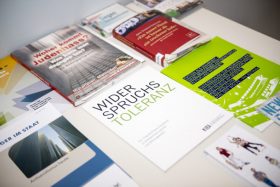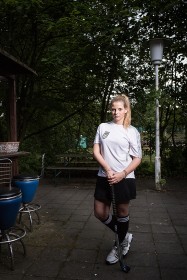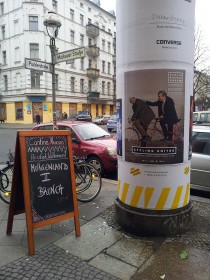Experts discuss political adult education on the Middle East conflict

Many educational providers offer materials for confronting anti-Semitism pedagogically; Jewish Museum Berlin, photo: Nadja Rentzsch
“Emotional” and “complex” are words often used to describe the Middle East conflict and approaches to it. How should it be handled in the everyday practice of education and continuing education? This is one of the questions in my research project “Didactics of the Middle East Conflict,” which I am conducting as a W. M. Blumenthal Fellow (more about the project on the museum website).
At a university or an institute, generally there is a research colloquium full of people working on similar themes, or who at least come from the same discipline. In such colloquia, one can present new work, discuss initial findings, get feedback about dealing with difficulties, and discover stimulating new ideas. At a museum, people engage with a great variety of topics, but not with empirical research on the didactics of the Middle East conflict. And so on September 8th, I invited external experts on educational work relating to the Middle East conflict, anti-Semitism, and racism to come to the museum. We discussed teaching and learning on this subject with members of the Education Department and the museum’s Academy Programs. → continue reading
The 14th European Maccabi Games (EMG) are taking place in Berlin from 27 July until 5 August 2015. More than 2,000 Jewish athletes from 36 countries will compete in 19 sports from football to fencing to chess. To accompany the games Tamar Lewinsky and Theresia Ziehe are producing a series of portraits with interviews, introducing a new member of the German delegation from Berlin every day here on the blog. They conducted the interviews on the grounds of the TuS Maccabi in Berlin’s Grunewald where Stephan Pramme also shot the portraits.
Sarah Geldmann (25), Hockey

Sarah (25) hockey © Jewish Museum Berlin, photo: Stephan Pramme
Sarah, what meaning does it hold for you that the European Maccabi Games are taking place in Berlin?
The symbolism is intense, I think. We represent Jewish life in Germany, and, as hosts, we can show other nations that there aren’t just a few of us in Germany, as some may think. There is Jewish life here, and Berlin has become a hotspot for Israelis. Even if some had concerns, it’ll for sure be a great event.
Jewish athletes were barred from the 1936 Olympics. Now this is exactly where most of the European Maccabi Games are taking place. What do you think about that?
Of course, it has a huge historical meaning. There are survivors who are with us, and I’m proud we can show them we’re here again. → continue reading
Pessach is approaching – the festival of exodus and freedom. This year, there is less talk of having the festive meal at large community gatherings. It is obvious, although unspoken, that smaller gatherings in the home make more sense. We are becoming alienated from our community centers through fear. Keep a low profile. Don’t speak Hebrew on the streets. Some people are removing the mezuzah from their front doorposts, a traditional object that visibly identifies a Jewish household. There is a mood of caution and nervous apprehension.
How did it get to this point?

Advertisement with Imam Ferid Heider and Rabbi Daniel Alter for the “Cycling Unites”-Critical-Mass-Tour in Berlin on 22 March 2015, photo: Michal Friedlander
June, 2014
A drunken man rolls slowly off the train platform and plops onto the tracks at Friedrichstrasse station. Around sixty people witness the moment and look away, hoping that someone else will solve the stinky, awkward problem. And so it was. An Italian and an Israeli jumped down to haul the semi-conscious man to safety. The passengers walked around the startled little group, pressing forward to make the oncoming train.
July 2014
Dinner party small talk. The discussions nearest me are taking a more political turn and I am just not in the mood to talk about Israel. Too late. The young man next to me asks if I saw the recent pro-Palestinian demonstration on the Kurfürstendamm? He becomes very still and lowers his voice. → continue reading


